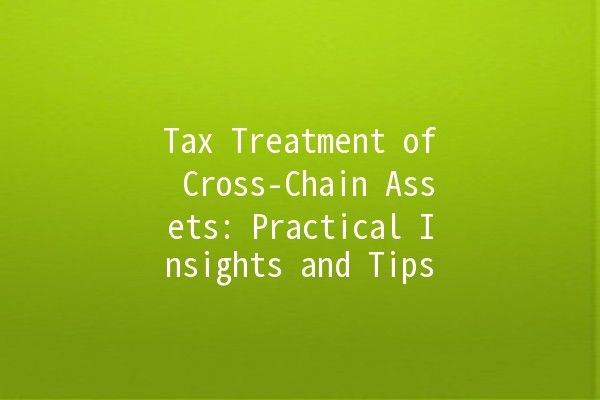




In the fastevolving world of blockchain and cryptocurrencies, crosschain assets are becoming increasingly prominent. As various blockchain networks develop and interoperate, so do the complexities surrounding the tax implications of these assets. Understanding the tax treatment of crosschain assets is critical for investors, users, and businesses operating within this space. This article will provide practical insights into navigating the tax landscape surrounding crosschain assets while highlighting productivity techniques that can enhance taxrelated decisionmaking.
Crosschain assets refer to digital assets that can operate across multiple blockchain networks. For example, an asset created on Ethereum could be transferred and used on a different blockchain like Binance Smart Chain or Polkadot. This interoperability allows for greater flexibility but also complicates the taxation process.
The tax treatment of crosschain assets varies based on jurisdiction, the nature of the transaction, and the specifics of the asset involved. In most countries, the fundamental principle is that digital assets are treated as property rather than currency, meaning that gains and losses can trigger capital gains tax.

When you sell or exchange a crosschain asset for profit, you may incur capital gains tax. The gain is calculated by subtracting your original purchase price (basis) from the sale price. If the letter is higher, the difference is a taxable gain.
Example: If you bought a cryptocurrency for $500 and sold it for $1000 when using a crosschain bridge, you would report a $500 capital gain.
Historically, some investors have utilized likekind exchange provisions under IRS rules to defer taxes on exchanges of digital assets. However, due to increased scrutiny and regulation, especially concerning cryptocurrencies, the applicability of likekind exchanges is questionable and often limited.
When transacting crosschain, you may incur transaction fees paid in the native assets of the chains involved. These fees can also impact your basis in the assets bought or sold.
Participating in crosschain staking or yield farming activities can lead to taxable income. The fair market value of any rewards received must be reported as income in the year it was earned.
It's essential to maintain thorough records of all your transactions, including dates, amounts, involved parties, and the specific blockchain networks used. Many taxpayers overlook this detail, leading to issues with reporting.
Managing taxes related to crosschain assets can be overwhelming, but here are five productivityenhancing strategies:
Description: Implementing tax tracking software can simplify the process of recording your transactions across different blockchains.
Application:
There are several platforms available that can automate the tracking of crosschain transactions, providing realtime reporting on gains, losses, and overall portfolio value. Tools like CoinTracker or Koinly can sync with various wallets and exchanges, reducing manual entry.
Description: Keeping a comprehensive transaction log is vital for accurate tax reporting.
Application:
Create a standard spreadsheet to track every transaction, including the trading date, asset type, amounts, transaction fees, and the blockchain platforms used. Regular updates will help prevent yearend plummeting into disorganization.
Description: Engaging a tax professional knowledgeable in cryptocurrency can provide tailored advice.
Application:
Seek out an accountant or adviser who specializes in digital assets. They can guide you through jurisdictionspecific regulations and help ensure compliance while optimizing tax treatment.
Description: Regular reminders can keep you on track with necessary taxrelated tasks.
Application:
Set monthly reminders to review your transaction log, calculate estimates of your tax liabilities, and make necessary quarterly tax payments based on your investments in crosschain assets.
Description: Tax laws governing cryptocurrencies are subject to change.
Application:
Follow industry news, subscribe to relevant tax law newsletters, and participate in forums that discuss cryptocurrency laws. Staying updated will help you adapt quickly to potential changes that may impact your tax obligations.
Yes, all transactions involving the exchange or sale of crosschain assets should be reported for tax purposes. This includes trades, exchanges, and any income derived from staking or yield farming.
The cost basis is typically the amount you paid for the asset, including any transaction fees. If you acquired the asset via a different bridge or network, you would still use your original purchase price as your basis for taxation.
Failing to report can lead to penalties, fines, and interest on unpaid taxes owed to the IRS or your local tax authority. In severe cases, it might lead to audit scrutiny and further legal implications.
Yes, converting digital assets to fiat often triggers a taxable event, similar to exchanges between different cryptocurrencies. The asset's fair market value at the time of transaction determines the gain or loss.
Yes, you can use capital losses from other investments, including losses from crosschain transactions, to offset capital gains, therefore reducing your overall tax liability.
Airdrops are generally considered taxable income at the fair market value of the assets received when they are credited to your account. As a result, you must report this income on your tax return for the year it was received.
Crosschain assets present unique opportunities and challenges, particularly concerning taxation. By understanding the basic principles and utilizing productivityenhancing techniques, you can navigate the complexities effectively. Being proactive with recordkeeping and compliance can significantly reduce stress and ensure proper handling of your digital asset investments. As the landscape continues to evolve, equipping yourself with knowledge will empower your decisionmaking process both in investments and in managing associated tax obligations.